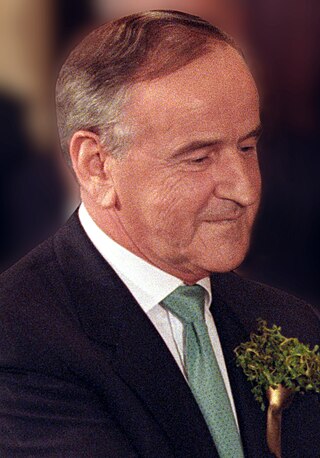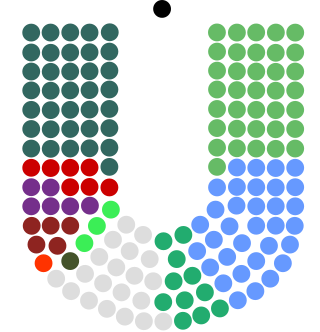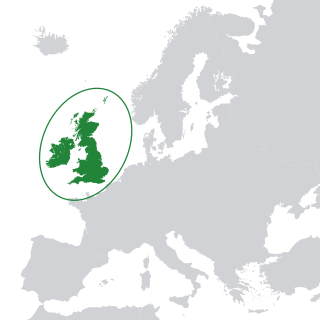Related Research Articles

The Taoiseach is the head of government or prime minister of Ireland. The office is appointed by the President of Ireland upon the nomination of Dáil Éireann and the office-holder must retain the support of a majority in the Dáil to remain in office.

Albert Martin Reynolds was an Irish Fianna Fáil politician who served as Taoiseach and Leader of Fianna Fáil from 1992 to 1994. He held cabinet positions between 1979 and 1991, including as minister for finance from 1988 to 1991. He served as a Teachta Dála (TD) for Longford–Roscommon from 1977 to 1992 and for Longford–Westmeath from 1992 to 2002.

The Oireachtas, sometimes referred to as Oireachtas Éireann, is the bicameral parliament of Ireland. The Oireachtas consists of the president of Ireland and the two houses of the Oireachtas, a house of representatives called Dáil Éireann and a senate called Seanad Éireann.

David Andrews is an Irish former Fianna Fáil politician who served as Minister for Foreign Affairs from 1992 to 1993 and 1997 to 2000, Minister for Defence from 1993 to 1994 and June 1997 to October 1997, Minister for the Marine from 1993 to 1994, Minister of State at the Department of Foreign Affairs from 1977 to 1979 and Government Chief Whip and Minister of State at the Department of Defence from 1970 to 1973. He served as a Teachta Dála (TD) from 1965 to 2002.
The 26th government of Ireland was the government of Ireland formed after the 2002 general election to the 29th Dáil which had been held on 17 May 2002. It was led by Fianna Fáil leader Bertie Ahern as Taoiseach, with Progressive Democrats leader Mary Harney as Tánaiste. It was the first, and to date only, coalition government to be returned to government after an election; both parties increased their number of seats, and together secured a Dáil majority, where in the previous government they had governed together as a minority government dependent on the support of Independent TDs. It lasted for 1,835 days.
The 25th government of Ireland was the government of Ireland formed after the 1997 general election to the 28th Dáil held on 6 June 1997. It was a minority coalition government of Fianna Fáil and the Progressive Democrats, led by Fianna Fáil leader Bertie Ahern as Taoiseach. It lasted 1,807 days.

The 1997 Irish general election to the 28th Dáil was held on Friday, 6 June, following the dissolution of the 27th Dáil on 15 May by President Mary Robinson, on the request of Taoiseach John Bruton. The general election took place in 41 Dáil constituencies throughout Ireland for 166 seats in Dáil Éireann, the house of representatives of the Oireachtas, under a revision in the Electoral (Amendment) Act 1995.

The Leader of the Opposition in Ireland is a de facto term sometimes used to describe the politician who leads the largest party in the Parliamentary Opposition in the lower house of the Irish Parliament, Dáil Éireann. In the Dáil, the Leader of the Opposition sits on the right-hand side of the Ceann Comhairle and directly opposite the Taoiseach. The role is not an official one and is not recognised in the Irish constitution, nor in legislation.
Events from the year 2004 in Ireland.
Events from the year 1999 in Ireland.

According to the Constitution of Ireland, the names of the Irish state are Ireland (English) and Éire (Irish). From 1922 to 1937, its legal names were the Irish Free State (English) and Saorstát Éireann (Irish). The state has jurisdiction over almost five-sixths of the island of Ireland. The rest of the island is Northern Ireland, a part of the United Kingdom. In 1948 Ireland adopted the terms Republic of Ireland (English) and Poblacht na hÉireann (Irish) as the official descriptions of the state, without changing the constitutional names.

The 2007 Irish general election took place on Thursday, 24 May after the dissolution of the 29th Dáil by the President on 30 April, at the request of the Taoiseach. The general election took place in 43 parliamentary constituencies throughout Ireland for 166 seats in Dáil Éireann, the lower house of parliament, with a revision of constituencies since the last election under the Electoral (Amendment) Act 2005.

The terminology of the British Isles comprises the words and phrases that are used to describe the geographical and political areas of the islands of Great Britain, Ireland, and the smaller islands which surround them. The terms are often a source of confusion, partly owing to the similarity between some of the actual words used but also because they are often used loosely. Many of the words carry geographical and political connotations which are affected by the history of the islands.

Bartholomew Patrick "Bertie" Ahern is an Irish former Fianna Fáil politician who served as Taoiseach from 1997 to 2008, Leader of Fianna Fáil from 1994 to 2008, Leader of the Opposition from 1994 to 1997, Tánaiste and Minister for Arts, Culture and the Gaeltacht from November 1994 to December 1994, Deputy Leader of Fianna Fáil from 1992 to 1994, Minister for Industry and Commerce in January 1993, Minister for Finance from 1991 to 1994, Minister for Labour from 1987 to 1991, Government Chief Whip and Minister of State at the Department of Defence from March 1982 to December 1982 and Lord Mayor of Dublin from 1986 to 1987. He served as a Teachta Dála (TD) from 1977 to 2011.

Since at least 1542, England and later Great Britain and Ireland have been connected politically, reaching a height in 1801 with the creation of the United Kingdom of Great Britain and Ireland. About five-sixths of the island of Ireland seceded from the United Kingdom in 1922 as the Irish Free State. Historically, relations between the two states have been influenced heavily by issues arising from their shared history, the independence of the Irish Free State and the governance of Northern Ireland. These include the partition of Ireland and the terms of Ireland's secession, its constitutional relationship with and obligations to the UK after independence, and the outbreak of political violence in Northern Ireland. Additionally, the high level of trade between the two states, their proximate geographic location, their common status as islands in the European Union until Britain's departure, common language and close cultural and personal links mean political developments in both states often closely follow each other.
The 30th Dáil was elected at the 2007 general election on 24 May 2007 and met on 14 June 2007. The members of Dáil Éireann, the house of representatives of the Oireachtas (legislature) of Ireland, are known as TDs. The 30th Dáil lasted 1,329 days, and saw a change of Taoiseach from Bertie Ahern to Brian Cowen. The 30th Dáil was dissolved by President Mary McAleese on 1 February 2011, at the request of the Taoiseach Brian Cowen.

The toponym "British Isles" refers to a European archipelago comprising Great Britain, Ireland and the smaller, adjacent islands. The word "British" has also become an adjective and demonym referring to the United Kingdom and more historically associated with the British Empire. For this reason, the name British Isles is avoided by some, as such usage could be interpreted to imply continued territorial claims or political overlordship of the Republic of Ireland by the United Kingdom.
Fianna Fáil was founded on 23 March 1926 when a group of Dáil deputies led by Éamon de Valera split from the original Sinn Féin. This happened because de Valera's motion calling for elected members be allowed to take their seats in the Dáil, if and when the controversial Oath of Allegiance was removed, failed to pass at the Sinn Féin Ard Fheis. The new party adopted its name on 2 April of the same year. From the formation of the first Fianna Fáil government on 9 March 1932 until the 2011 general election, the party was in power for 61 of 79 years. Its longest continuous period in office was 15 years and 11 months. Its single longest period out of office, in that time, has been four years and four months. All eight of its party's leaders have served as Taoiseach. It was the largest party in Dáil Éireann at every general election from the 1932 general election until the 2011 general election, when it suffered the worst defeat of a sitting government in the history of the Irish state.

The Good Friday Agreement (GFA) or Belfast Agreement is a pair of agreements signed on 10 April, Good Friday, 1998, that ended most of the violence of the Troubles, an ethno-nationalist conflict in Northern Ireland since the late 1960s. It was a major development in the Northern Ireland peace process of the 1990s. It is made up of the Multi-Party Agreement between most of Northern Ireland's political parties, and the British–Irish Agreement between the British and Irish governments. Northern Ireland's present devolved system of government is based on the agreement.
The Forum for Peace and Reconciliation was a forum established by the government of Ireland in October 1994 as part of the Northern Ireland peace process.
References
- ↑ Coulter, John (Summer 2005). "Revolutionary Unionism". Open Republic Magazine. Open Republic Institute. Archived from the original on 2013-04-15. Retrieved 2006-07-28.
- ↑ Aughey, Arthur (2005). The Politics of Northern Ireland: Beyond the Belfast Agreement. New York: Routledge. p. 91.
- ↑ Marc Mulholland, Northern Ireland at the Crossroads: Ulster Unionism in the O'Neill Years, 1960–9 (Macmillan, 2000), p. 169.; Stephen Oppenheimer, Origins of the British, Constable and Robinson (London, 2007), p.xvi; Martyn Bennett(2003). "What's in a Name? the Death of the English Civil War: Martyn Bennett Examines How the Terminology We Use about the Great Conflict of the Mid-Seventeenth Century Reflects and Reinforces the Interpretations We Make"; Nicholas Canny, "Writing Early Modern History: Ireland, Britain, and the Wider World" in The Historical Journal, 46, 3 (2003), pp. 723–747.
- 1 2 Ahern, Bertie (1998-10-29). "Address at 'The Lothian European Lecture' - Edinburgh". Department of the Taoiseach, Taoiseach's Speeches Archive 1998. Archived from the original on 2007-09-27. Retrieved 2006-07-28.
- ↑ Dáil Debates. Vol 484. Col.466. 9 December 1997. Archived 7 June 2011 at the Wayback Machine
- ↑ Article 20.4.3